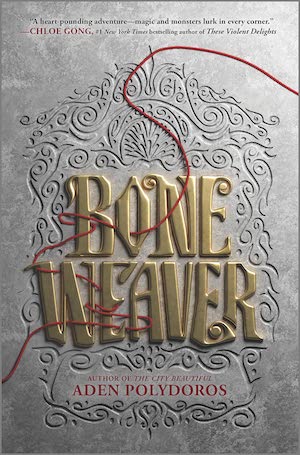In the wild Edge of the Kosa Empire, Toma lives with her adoptive family. But they aren’t like other people. Her parents and sister are upyr, undead creatures that typically eat the living, although they’ve chosen to abstain and wither into desiccation instead. When an imperial airship crashlands in a clearing, Toma saves the life of young Tsar Mikhail with her magical embroidery skills. Her sister, Galina, however, is captured by Mikhail’s enemies to be given to Koschei, the man behind the civil war currently destroying much of Kosa.
The pair set off on a quest to save Galina and help Mikhail defeat the leader of the revolution. Along the way, they collect Vanya, a boy with powers that mark him as a threat solely because he had the audacity to be born Strannik, an oppressed religious and ethnic group residing within the empire’s borders. Now a trio, the teens fight off deadly monsters and even deadlier men as they try to save their homeland and each other.
Much of Aden Polydoros’ new YA fantasy novel deals with identity, of figuring out who you are when the world wants you to be something else. As a royal, Mikhail is an agent of the system. He directly benefits from the oppression of the Strannik and the proletariat, but he is also bound to his throne by that same system. As one of the oppressed Strannik, Vanya longs to be as free as Mikhail appears, but even his own people fear him. Having that kind of power means nothing good for the other Strannik or the other revolutionaries. Toma has put herself into a box by literally and metaphorically running from her past. Vanya and Mikhail tear down her walls and show her a world of possibilities. Each teen realizes they are greater than the sum of their parts and even greater as a trio.
Buy the Book


Bone Weaver
Bone Weaver intentionally has a lot of real world parallels. As mentioned in the author’s note, the worldbuilding is heavily influenced by his research into Slavic folklore and the genealogical research he did in tracing his Jewish ancestors through imperial Russia. I’m certainly no expert on this historical era, but I do know that it’s a lot more complicated than the novel gets into. Which is fine. This is a second world YA fantasy, not historical nonfiction. While the results of the Bolshevik Revolution were more authoritarian than communal, that doesn’t mean the days of the empire were ideal or better, either. That being said, I was left feeling unsettled by the ending of the novel.
I’m staying vague to avoid spoilers, so let me just say that the political motivations and choices of Toma, Mikhail, and Vanya made an easy sense within the novel itself but were frustrating when the real-world consequences of imperialism were taken into account. What happened and continues to happen in Eastern Europe cannot be separated from what happens in the book; there’s too much real-world influence for the novel to stand entirely on its own. To me, the ending felt too much like *dusts hands* “problem solved!” There was some acknowledgement of the oppressions of the tsarist regime, but they were nullified by both-sidesing with the violence instigated by the rebels. I wanted more critique, more pushback. I wanted revolution, not reform.
The worldbuilding veers between just right and not enough. Polydoros doesn’t skimp on details about places and people. Readers should walk away with a good grasp of the culture and religious beliefs, what the characters look like and how they dress, and what the monsters are like. What I didn’t get is how the magical system worked, particularly in relation to the monsters. Koschei’s reasons for wanting Galina seemed more like a convenient plot device than anything else, and I am still hazy as to why the teens have such different interactions with the folkloric creatures than everyone else. These are minor issues that don’t bog down the reading, but when a book, especially a young adult one, clocks in at nearly 450 pages, I’d rather not have questions like that hanging over me the whole time.
I was pleased to see a glossary at the back of my review copy. With all the mythological creatures and unique terminology, this was a helpful addition. I haven’t seen a final copy of the book, but I hope there’s a map in it. It was tricky keeping track of locations, in part because the characters moved around a lot, and also because several locations are only mentioned in passing rather than visited but are important to the plot nonetheless. Even without the map, I appreciated how Polydoros made the world feel vast and boundless while also keeping the story contained. To Toma, Mikhail, and Vanya, everything that takes place is life-or-death, yet Polydoros gives readers tantalizing slices of the outside world that will one day kick the door down to the Kosa Empire. I almost wish we’d get a sequel set a century later, just to see where things land.
Overall, Bone Weaver is a solid sophomore novel from Aden Polydoros. He has a good eye for writing teens in historical-esque and horror-lite settings. If he’s been sitting in your TBR, Bone Weaver is a perfect excuse to move him to the top of the list.
Bone Weaver is published by Inkyard Press.
Alex Brown is a Hugo-nominated and Ignyte award-winning critic who writes about speculative fiction, librarianship, and Black history. Find them on twitter (@QueenOfRats), instagram (@bookjockeyalex), and their blog (bookjockeyalex.com).










